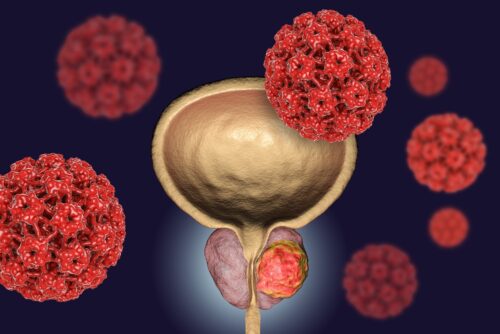Prostate Cancer
Prostate Cancer
It is cancer of the prostate gland and the most common cancer in men above 50
Prostate cancer is cancer of the prostate. The prostate is a gland in the male reproductive system that surrounds the urethra just below the bladder. Most prostate cancers are slow growing. Cancerous cells may spread to other areas of the body, particularly the bones and lymph nodes. It may initially cause no symptoms. Factors that increase the risk of prostate cancer include older age, family history and race. About 99% of cases occur after age 50. A first-degree relative with the disease increases the risk two- to three-fold. Other factors include a diet high in processed meat and red meat. Diagnosis is by biopsy. Medical imaging may be done to assess whether metastasis is present.

Frequently Asked Questions on Prostate Cancer
How do I know if I have prostate cancer?
Waiting for signs and symptoms may be too late. The most common way the cancer is picked up is via a blood test called prostate specific antigen also known as PSA test, which if above a certain range denotes an increased risk of you having cancer.
Your doctor will then advise a physical examination, possibly an MRI of the prostate and subsequently a biopsy. The biopsy is usually the confirmatory test for prostate cancer.
Is prostate cancer it curable?
This is one cancer that can sometimes “not” be treated and just observed. Treatment is only initiated if the cancer 'misbehaves'.
What are the treatment options for prostate cancer?
The curative options are radical surgery to remove the prostate, radical radiotherapy, focal therapy in selected centers around the world.
There are cases in which hormonal treatment may be used concomitantly or as primary treatment if cure is not possibly but control is desired.
For more advanced cases there are options of chemotherapy and immunotherapy as well.
When should I see doctor or seek medical help?
Prostate cancer screening is the best possible way to avoid complications or finding out if you have early onset of prostate cancer. Screening at least every 2 years above the age of 50 is recommended for people who have a higher tendency of prostate cancer or otherwise.
If you have raised a PSA or have 1st degree relative i.e. father or brother with prostate cancer you must get screened regularly.
Consult an urologist if you have blood in the urine.
Can I prevent prostate cancer?
Unfortunately there is no proven method of prevention of prostate cancer. However early detection can save your life hence screening is highly recommended at least every 2 years.
Committed to Men's Health
When it comes to urological ailments or sexual disorders, men are less open to seek medical care at the onset. This is due to various factors linked to lack of awareness, social stigma, and the belief that men’s health is age-related. At UROHEAL, are committed to change this and make urological issues in men more mainstream – leading to faster diagnosis and better treatment
Men's Health Screening
Just like we go for a regular checkups for our heart, blood pressure, diabetes etc. we need to check for urological health regularly; especially when we are above 40 years of age. This can prevent complications later and help us to lead a normal, active, and fulfilling life as we grow older. Men’s Health Screening can save lives. We have collaborated with reputed hospitals to provide Men's Health Screening at affordable costs
Spreading Awareness
We need to keep ourselves updated on the common ailments and diseases which can affect us. By knowing about them and the treatment options available to all of us we would be in a better position to cope, if we ever get affected. At UROHEAL we are continuously encouraging our patients and the society at large to keep themselves updated on Men’s Health though our website, social media pages and public forums. To keep updated on our blog posts please follow us on Facebook.
Contact us:
If you are having any symptoms like urinary inconsistence, erectile dysfunction, pain in the lower back, frequent urination, waking up at night to urinate, pain in your urinary system, blood in the urine, or any other symptoms which you feel might require a urologist’s opinion, please feel free to leave a comment and send it to us.
We maintain a high level of privacy for our patients and do not disclose their patient information to any 3rd party. For more details please see our Privacy Policy.
Dr. Datesh Daneshwar
FRCS (Urology) (Glasgow) - Consultant Urologist & Robotic Surgeon
A man on a mission to fight against the social stigma against men’s sexual health for over 2 decades. "Imagine a successful man, a loving husband; a caring father, god forbid if he develops a heart condition, he immediately gets the full support and sympathy of his family and friends. However, if the same person develops urological issues, he has to deal with it completely by himself for the fear of being labeled an ‘impotent’ or ‘sexually-incompetent’ person. This is so unfair, especially in today’s day and age, when we are denouncing every social stigma and challenging them in every field. Nobody should suffer in SILENCE"

Dr. Datesh’s Profile at a Glance


Dr. Datesh Daneshwar is the first Urologist in Southeast Asia to adopt the use of the technologically advanced DUOLITH® SD-1 T-TOP »ultra« shock wave system for the treatment of Erectile Dysfunction.
He is one of STORZ MEDICALS’s appointed Key Opinion Leaders (KOL) for Urological applications, utilising the DUOLITH® SD-1 T-TOP »ultra« shock wave system and also serves as the Regional Trainer for STORZ MEDICAL.
STORZ MEDICAL - GERMANY
